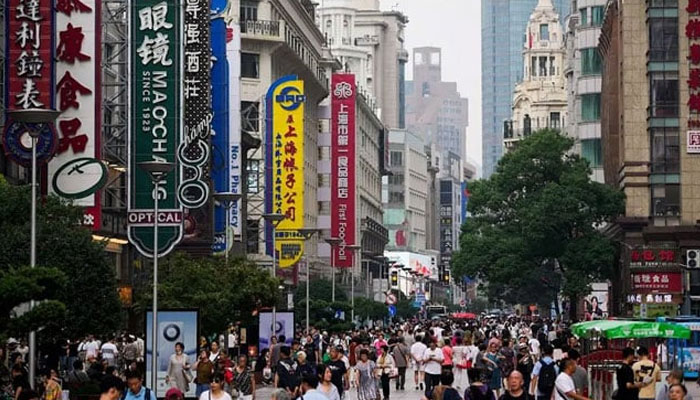China’s deflationary spiral is now entering dangerous new stage
Deflation stalking China since last year is now showing signs of spiraling, threatening to worsen the outlook for the world’s second-largest economy and raising calls for immediate policy action, according to Bloomberg.
Data released Monday confirmed that apart from food costs, consumer price growth barely registered in large swathes of the economy at a time when incomes are sagging.A broader measure of economy-wide prices known as the gross domestic product deflator will likely extend its current five-quarter drop into 2025, according to Bloomberg Economics and analysts at banks including BNP Paribas SA. That would amount to China’s longest streak of deflation since data began in 1993.
“We are definitely in deflation and probably going through the second stage of deflation,” said Robin Xing, chief China economist at Morgan Stanley, citing evidence from wage decreases. “Experience from Japan suggests that the longer deflation drags on, the more stimulus China will eventually need to break the debt-deflation challenge.”
The danger for China is deflation could snowball by encouraging households reeling from falling paychecks to cut back on spending, or delay purchases because they expect prices to fall further. Corporate revenues will suffer, stifling investment and leading to further salary cuts and layoffs, bankrupting families and firms.
Private surveys show that’s already starting to happen. In sectors of the economy favored by the government -- such as electric vehicle-manufacturing and renewables -- entry-level salaries declined by almost 10 per cent in August from a peak in 2022, according to findings by Caixin Insight Group and Business Big Data Co.
A survey of 300 company executives by the Cheung Kong Graduate School of Business showed growth in labor costs last month was the weakest since April 2020, when China’s initial Covid lockdowns began to ease.
It’s a cycle the world has seen before in Japan starting in the 1990s during a period that came to be known as its ‘lost decades’ -- when a grinding stagnation followed a burst bubble in real estate and financial markets.
While Chinese officials have sought to stifle discussion about deflation, warning analysts to avoid using the term, it’s beginning to enter public dialogue. Former central bank Governor Yi Gang last week said rooting out deflation has to take priority for policymakers, a rare admission by a prominent figure in China that falling prices are threatening the outlook.
Yi called for “proactive fiscal policy and accommodative monetary policy” and said officials “should focus on fighting deflationary pressure,” at a panel discussion at the Bund Summit in Shanghai on Friday. China’s immediate goal should be to turn its GDP deflator positive in the coming quarters, he said. So far, officials have given no sign of any significant shift from their cure-all of encouraging production rather than addressing weak demand with steps such as greater government spending on public services and consumer subsidies.
In a sign price pressures are becoming even more subdued, China’s core inflation -- which strips out volatile items such as food and energy -- cooled in August to the weakest in more than three years. Expectations for deflation are spilling into markets, stoking a bond rally that’s sent yields to record lows and stoked official concerns that banks have become too exposed to interest-rate risks.
The weak price pressures are evident in the growth pace of China’s nominal GDP, which expanded just 4.0 per cent in the second quarter -- well under the nation’s real economic growth goal of around 5.0 per cent this year.
At times of weak price gains, nominal expansion is a more useful indicator because it better reflects changes in wages, profits and government revenue, Luo Zhiheng, chief economist at Yuekai Securities Co, wrote in a note earlier this month.
-
 James Van Der Beek's Friends Helped Fund Ranch Purchase Before His Death At 48
James Van Der Beek's Friends Helped Fund Ranch Purchase Before His Death At 48 -
 King Charles ‘very Much’ Wants Andrew To Testify At US Congress
King Charles ‘very Much’ Wants Andrew To Testify At US Congress -
 Rosie O’Donnell Secretly Returned To US To Test Safety
Rosie O’Donnell Secretly Returned To US To Test Safety -
 Meghan Markle, Prince Harry Spotted On Date Night On Valentine’s Day
Meghan Markle, Prince Harry Spotted On Date Night On Valentine’s Day -
 King Charles Butler Spills Valentine’s Day Dinner Blunders
King Charles Butler Spills Valentine’s Day Dinner Blunders -
 Brooklyn Beckham Hits Back At Gordon Ramsay With Subtle Move Over Remark On His Personal Life
Brooklyn Beckham Hits Back At Gordon Ramsay With Subtle Move Over Remark On His Personal Life -
 Meghan Markle Showcases Princess Lilibet Face On Valentine’s Day
Meghan Markle Showcases Princess Lilibet Face On Valentine’s Day -
 Harry Styles Opens Up About Isolation After One Direction Split
Harry Styles Opens Up About Isolation After One Direction Split -
 Shamed Andrew Was ‘face To Face’ With Epstein Files, Mocked For Lying
Shamed Andrew Was ‘face To Face’ With Epstein Files, Mocked For Lying -
 Kanye West Projected To Explode Music Charts With 'Bully' After He Apologized Over Antisemitism
Kanye West Projected To Explode Music Charts With 'Bully' After He Apologized Over Antisemitism -
 Leighton Meester Reflects On How Valentine’s Day Feels Like Now
Leighton Meester Reflects On How Valentine’s Day Feels Like Now -
 Sarah Ferguson ‘won’t Let Go Without A Fight’ After Royal Exile
Sarah Ferguson ‘won’t Let Go Without A Fight’ After Royal Exile -
 Adam Sandler Makes Brutal Confession: 'I Do Not Love Comedy First'
Adam Sandler Makes Brutal Confession: 'I Do Not Love Comedy First' -
 'Harry Potter' Star Rupert Grint Shares Where He Stands Politically
'Harry Potter' Star Rupert Grint Shares Where He Stands Politically -
 Drama Outside Nancy Guthrie's Home Unfolds Described As 'circus'
Drama Outside Nancy Guthrie's Home Unfolds Described As 'circus' -
 Marco Rubio Sends Message Of Unity To Europe
Marco Rubio Sends Message Of Unity To Europe




